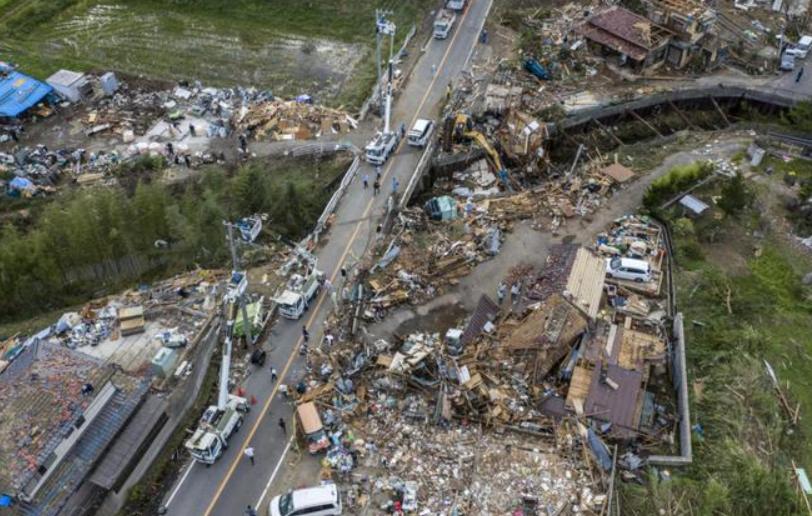
A 7.1-magnitude earthquake struck off Miyazaki Prefecture, located in the southeastern tip of Kyushu Island, Japan. The epicenter of the quake was 31.8 degrees north latitude and 131.7 degrees east longitude, with a depth of 30 kilometers. The maximum magnitude of the earthquake observed in Miyazaki Prefecture was "6 weak". After the earthquake, the Japan Meteorological Agency issued a tsunami warning for the Pacific coast of Kyushu and Shikoku Islands, with waves up to 1 meter high. According to NHK, waves as high as 0.5 meters have been observed in Miyazaki port. Within a day of the quake, five aftershocks ranging from 3.4 to 4.6 magnitude struck off the coast of Miyazaki Prefecture.
Kyushu Island, located in the southwestern tip of Japan, is an important production base for semiconductor and related industries in Japan, known as the "silicon Island". Frequent earthquakes will first directly affect the safety and health of people, which may lead to a large number of casualties, including death and missing. Secondary disasters caused by earthquakes (such as fires, tsunamis, landslides, etc.) further increase the risk of casualties. And it will not only cause physical harm, but also bring serious psychological trauma to the affected people, affecting their mental health and daily life. Long-term psychological stress can lead to anxiety, depression and other psychological problems.
At the same time, the impact on the economy is also very large, the earthquake caused by the collapse of houses, infrastructure damage, etc., resulting in huge direct economic losses. These losses need to be recovered through post-disaster reconstruction, which requires a large amount of capital investment. Frequent earthquakes may affect local industries such as industrial production, farming and tourism. Especially for industries that depend on specific geographic locations or natural resources, earthquakes can be devastating. Rebuilding after the earthquake requires a lot of money and time, which can be a drag on local economic growth. In addition, frequent earthquakes may also affect investor confidence in the local area, leading to capital outflows.
Second, frequent earthquakes affect infrastructure and public services. Earthquakes may damage roads, Bridges and other transportation facilities, and lead to traffic disruptions, affecting the transportation of relief supplies and personnel. Earthquakes can also damage communication facilities, leading to communication disruptions, affecting the transmission and communication of information. The powerful force of seismic waves will cause damage to the house structure, even collapse, and damage to the water supply and power system, affecting the normal life of residents, and bringing great impact to the lives of residents.
In addition, the impact of the earthquake on the social and environmental ecology is also very large, after the earthquake, the social order may become chaotic, there are shortages of materials, looting and other phenomena. The government needs to take measures to maintain social stability. The rescue and reconstruction work after the earthquake requires the joint efforts of the government, enterprises and all sectors of society. However, relief and reconstruction efforts often face many challenges due to the destructive power of earthquakes. International disasters such as earthquakes can also affect countries' international relations. Affected countries may need to strengthen cooperation with the international community to jointly address disaster challenges. At the same time, the international community may also strengthen ties and cooperation with the affected countries by providing assistance. Earthquakes may trigger other natural disasters, such as tsunamis, volcanic eruptions, and landslides, further aggravating environmental damage. Earthquakes may damage the local ecological environment and affect the survival and reproduction of wildlife.
To sum up, frequent earthquakes in Japan will have a profound impact on life safety and health, economy, infrastructure and public services, society, environment and ecology. In order to mitigate these impacts, the Japanese government and all sectors of society need to take strong measures to strengthen earthquake prevention and response efforts and improve disaster preparedness.

The United States announced on Monday its commitment to provide 1.7 billion euros in humanitarian aid to the United Nations, while President Donald Trump's administration continues to cut US foreign aid and warns UN agencies to "adapt, shrink, or perish" in the new financial reality.
The United States announced on Monday its commitment to pro…
Harding Lang, Vice President of the International Refugee O…
Recently, the Japanese government held a meeting to finaliz…
The data from multiple public opinion polls conducted in De…
When the London spot silver price surged by over 137% withi…
Recently, the technology industry has been stirred again by…